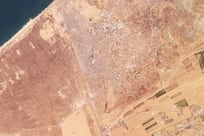ABU DHABI // The UAE is striving to develop an "indigenous" defence industry, the head of the country's Navy has said, after several multi-billion-dirham deals for the armed forces were signed last week. During the International Defence Exhibition and Conference (Idex), which ended on Thursday, some of the biggest military contracts were granted to local companies. Rear Admiral Ahmed al Tunaiji said that the driving force behind the commitment to local suppliers was a desire by the country's leadership to develop its own defence industry. "It achieves several purposes," he said. "Developing the defence industry in the UAE, keeping the money cycle within the state and transferring technology in defence industry and also training and making national cadres. "We don't discriminate and only buy from local companies, but when we see that products available in the local market compete with international markets, it's better," he said, adding that the Navy resorted to international firms if it needed equipment that could not be procured locally. One of the Navy's biggest contracts since the creation of the federation in 1972 is about to bear fruit when the first of six 72-metre warships is delivered this year. Abu Dhabi Ship Building (ADSB), the contractor, says the Baynunah-class battleship will satisfy the Navy's needs for years to come. In an interview with The National, Rear Admiral al Tunaiji said the Navy was following orders from Sheikh Khalifa, President of the UAE, to the armed forces to build deterrent defence capabilities. "Armed forces should have deterrence power because deterrence is important for defence," he said. "We don't see that there is a direct threat but we believe that we should take precautionary measures for any changing circumstances. "The area witnesses changes every once in a while and that's why we carry out our plans, part of which is buying more ships." Sheikh Khalifa said last week that the UAE's military doctrine was aimed at bolstering the country's sovereignty and attaining a "advanced, deterrent defence force to protect the nation, its people and gains". With tankers leaving the Arabian Gulf ports carrying an estimated 40 per cent of the world's daily oil supply, the UAE Navy could be more actively involved in protecting sea routes. "That's part of the plan, to be more self-sufficient in protection, instead of relying on other powers," said Dr Theodore Karasik, of the Institute for Near East and Gulf Military Analysis. "The UAE Armed Forces need to have robust capability that puts them ahead of everyone in the neighbourhood," he said. "The Navy is going forward - already it's the first naval power of the GCC." Last week, the UAE Armed Forces announced it had contracted ADSB to build 12 26.5-metre speed-fighting boats and refit 12 others for Dh935.4 million (US$235m). "These highly sophisticated vessels will provide considerable defensive firepower support for the UAE Navy," said a statement released yesterday by ADSB. The ships, which can do 40 knots (74.08kph), will be supplied to the Navy in three different versions, each with specialised weapon and mission systems. One will be fitted with an anti-ship missile system provided by MBDA, the leading European missile maker. The other two versions will be provided with mortar launchers and Rheinmetall 27mm guns. The Baynunah-class corvettes will be equipped with advanced weapon systems, said Abu Dhabi Systems Integration, a sister company of ADSB. The systems are to be supplied by 19 defence firms and the company has already started groundwork for fitting them. The destroyer will include surface-to-surface missiles, surface-to-air missiles, and 76mm and 30mm guns. Its 37 crewmen will be able to navigate the Gulf for 14 days before needing to resupply. As part of its expansion, the Navy is expected to finish the construction of a new naval base and ADSB said that it will be contracted with operating the base facilities. The company is already in charge of refitting and maintenance for the Navy. Also during Idex, the UAE Armed Forces announced plans to sign a contract with the Italian shipbuilder Fincantieri for an anti-submarine vessel, at an expected cost of Dh430 million. Abu Dhabi's Critical National Infrastructure Authority (CNIA) is buying speed assault boats to complement the work of the Navy. The authority signed a contract with ADSB to build 34 high-speed interceptor boats at a total cost of Dh460 million. The CNIA's director, Brig Muhair al Khateri, said the procurement was aimed at strengthening the ability to protect Abu Dhabi's oil rigs. With the upgrading of the country's Navy, other missions could arise, such as combating piracy. During their summit meeting in Oman in December, leaders of the six GCC states condemned the practice as an act of terrorism. But it is not clear whether the Gulf navies will be protecting the sea lanes beyond their own waters. mhabboush@thenational.ae
Deterrence 'key to defence'
The head of the UAE's navy says the country is striving to develop an "indigenous" defence industry.
Editor's picks
More from the national





